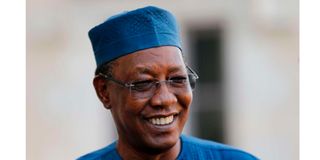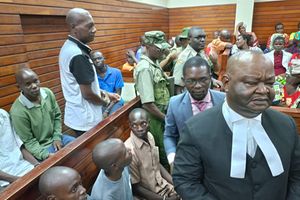Deby’s killing a veiled coup d’etat

In this file photo taken on January 13, 2020, Chad's President Idriss Deby arrives to attend a summit on the situation in the Sahel region in the southern French city of Pau.
Outside geography lessons at school, very few Kenyans know anything about the vast, landlocked central African territory known as Chad, and until last week, very few really cared. Indeed, the country holds two notable distinctions, both negative.
It is ranked as the seventh poorest country in the world, and on average, its citizens are not expected to live beyond 48 years. However, on Tuesday, it added another feather to its cap of dishonour: Its president was killed on the battlefield leading his troops to save his capital city from being captured by rebel fighters.
How President Idriss Deby met his end remains a mystery, and speculations vary from an ultimately successful assassination by his army in an elaborate coup, to a fatal misadventure on the battlefield by a man who forgot he was a president first and warrior last. If, indeed, he died of wounds inflicted by rebels during a confrontation, then the man may turn out to be a real hero to his countrymen. The last time this kind of thing happened was during the empire-building days of the middle ages in Europe and Asia when emperors, kings and vagabonds led their troops from the front.
Declared winner
However, it is also possible that some elements in his military-backed regime had grown tired of him and wished him gone, for he had been on the political scene for more than four decades, three of them as president. Indeed, it is curious that the man died only a day after he had been declared winner for a sixth term in elections boycotted by the opposition due to his intolerance and brutal repression.
My own feeling is that the man was simply removed from power in a coup d’etat that was only thinly disguised. It had all the elements. On the day that his death was announced, it was a military spokesman who did it. Secondly, as though this whole thing had been pre-arranged, a military transitional council was immediately formed with President Deby’s son, Mahamat, a four-star general, taking over the reins, albeit for a short period--18 months – ostensibly to allow for the restoration of democracy. But we have all heard such platitudes before.
Thirdly, all the country’s borders were immediately closed, a curfew imposed, the National Assembly dissolved, and the constitution suspended, thus denying the parliamentary Speaker, the man who, constitutionally, should have taken over power, the chance to take over.
Since it is not clear why the military had to intervene so fast when there was no lacuna in the constitution, this lends itself to all manner of speculation, and rightfully so. The rest of the world will probably never know what actually occurred and can only continue to guess why.
Power vacuum
On the other hand, a plausible reason for this speed was to avoid a power vacuum in a country at war with a well-armed rebel militia that has for decades threatened to overrun the capital city, Ndjamena. The rebels known as the Front for Change and Concord in Chad (FACT) were being backed by Field Marshal Khalifa Haftar, the man who has controlled half of Libya’s territory since the fall of Col Muammar Gaddafi in 2011. Their only ostensible reason for being seems to have been to remove Deby at all costs, and it is clear, from its pronouncements, that FACT are not about to give up on that mission just because he has been replaced by his son. The continent is not hearing the last of this rebel group any time soon.
What should concern us more is why one man can rule a country for 30 years and seek yet another term. Since Chad gained independence from France in 1960 under the founding president Francois Tombalbaye, its politics and security situation have always been extremely fragile.
Tombalbaye turned into an authoritarian who loathed democracy and brutally put down all his opponents until his military could not take it and killed him in a coup at a time when those things were popular in Africa. All the other leaders in the country have followed his footsteps.
It should have been expected that Deby would learn a few useful lessons from Tombalbaye’s fate, or from what happened to the man that he himself was to topple 15 years later, Hissene Habre. But no, he had to save his country through brutality and acute repression of his opponents.
African strongmen
When will African strongmen learn that longevity in office is always counter-productive and that repressing your fellow countrymen so that you can hang on to power always self-defeatist?
Africa is perhaps the only continent whose rulers never want to retire honourably, mainly because the crimes they have committed against their people with the backing of their militaries and repression from their security organs won’t let them. It is still home to the highest number of septuagenarian “liberators” who have no intention of ceding powers to anyone else for their own survival and that of their families and cronies, and they do it mostly by manipulating constitutions. Why then should we keep wondering who cursed this continent?





